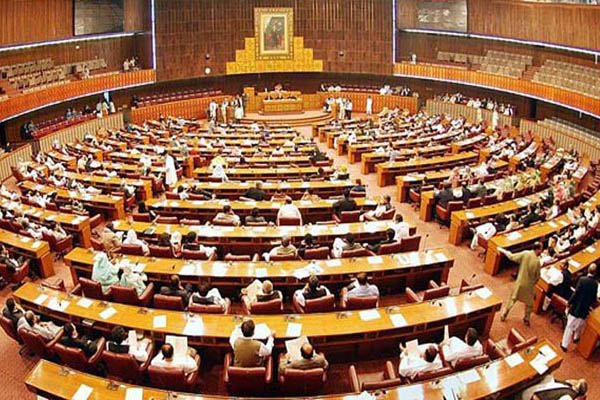
PPP announces it will support legislation if parliamentary rules followed; PMLN pledges ‘unconditional support’
Defense Minister Pervez Khattak, on behalf of the Pakistan Tehreek-e-Insaf-led government, on Friday tabled the Pakistan Army (Amendment) Act, 2020, in the National Assembly to secure a three-year extension in the tenure of Chief of Army Staff Gen. Qamar Javed Bajwa.
In light of the government’s promises to fix the tenure duration of all services chiefs, Khattak also separately presented the Pakistan Navy (Amendment Act) and the Pakistan Air Force (Amendment Act).
Under the proposed laws, the chairman of the Joint Chief of Staff Committee and the Army, Air, and Naval chiefs would now be able to serve till they are 64 years old. Their normal tenure of service would still end when they are 60, but the President of Pakistan, on advice of the prime minister, would have the prerogative to grant an extension to any of them at that time.
Shortly after the bills were tabled, the National Assembly session was adjourned until 11 a.m. tomorrow (Saturday). Based on the government’s zeal for the matter to be resolved as soon as possible—and the opposition’s seeming support of the legislation—the bills are also likely to be tabled before the Senate today. In light of concerns about parliamentary procedure and undue haste, a joint meeting of the Senate and National Assembly standing committees on defense has also been summoned today.
Addressing journalists after the bills were tables, Pakistan Peoples Party Chairman Bilawal Bhutto Zardari said his party had no issues with supporting the legislation so long as it was passed through parliamentary rules and regulations. He said the bills should first be examined by the National Assembly Standing Committee on Defense and then debated in the House. He also said the Pakistan Muslim League (Nawaz), which had announced its ‘unconditional support’ of the bills, had not taken the PPP into confidence on its position.
Adding confusion, a letter purportedly by PMLN chief Nawaz Sharif started making the rounds on social media, in which he backed the PPP’s position and said the legislation should be debated in Parliament before it was passed. To questions on this, PMLN lawmaker Khawaja Asif claimed he had received no such letter. Asif is currently one of the senior-most PMLN lawmakers in Parliament, as Nawaz and his brother are in London, and former prime minister Shahid Khaqan Abbasi is still in NAB custody.
During his press interaction, Bhutto-Zardari questioned the government’s “actual stance” on the Army chief extension. “The government has also challenged the Supreme Court’s order through its review petition, which on its face looks like a contradiction to me,” he said, noting that by enacting legislation the PTI-led government appeared to be accepting the same judgment it was now appealing.
Federal minister Fawad Chaudhry told reporters that the bills would be reviewed by the standing committees today and then debated tomorrow before they were passed. Appearing on talk shows, and in media conversations, PTI leaders have claimed the bills should pass with a simple majority—especially with the support of the PMLN.
The PPP’s Bhutto-Zardari admitted that his party lacked the numerical strength to block the legislation, adding that if the PMLN backed it, his party could not even alter a single “comma or period.”
The Supreme Court of Pakistan, last year, allowed Gen. Bajwa to continue as the Army chief for six months on the condition that the government would enact legislation within that time to provide legal “certainty and predictability” to the appointment/extension procedure for the top post.
Perhaps fearing more action from the court, the tabled bills contain a clause preventing any judicial scrutiny of future services chiefs’ appointments. Section 8B (2) states: “Notwithstanding anything contained in this act or any other law, or any order or judgment of any court, the appointment, reappointment or extension of the chairman, JCOSC, or the exercise of discretion by the appointing authority in this regard, shall not be called into question before any court on any ground whatsoever.”
